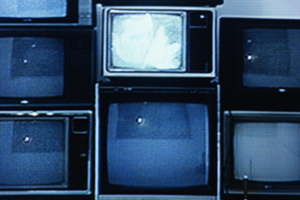
OPINION:
This is an essay by Australian journalist Geoffrey Barker. Although he writes about TV journalism across the ditch, we think his observations are worth sharing with our readers here as well.
The hair, usually blonde, tumbles artfully onto the shoulders. The eyes, usually blue, sparkle brightly. The complexions are perfect. The teeth are arctic white. The breasts are pert and perky.
Welcome to commercial TV journalism – where post-pubescent babes fill TV screens with their urgent and empty chatter from suburban shootings, accidents, fires, courthouses, showbiz first-night events, etc etc.
It does not much matter what the babes have to say about the mayhem and tragedy and whatever else attracts the attention of their newsrooms. What matters is how they look. The curling wand and the make-up box trump the notebook and pencil every time.
The babes don’t need much in the way of information as they address the camera. ”Here, behind me, on this quiet street, shots rang out this morning” … ”Police and ambulance workers could not revive the driver of this car after it collided with a petrol tanker” … ”This family lost everything when fire raced through their bushland home.” (Briefs shots of holes in a garage door, a twisted car wreck and some burnt-out buildings.)
Once in a while the babes stand up a policeman, a firemen or a local politician to utter a few banalities, and then it’s Thanks, Sharon or Tegan or whatever they are called, and off to a commercial break.
I have a problem with commercial TV news. I don’t want it delivered to me via crimson lips and fancy coiffures. I don’t like the way the TV babes compress sometimes urgent and ongoing matters into a few barely coherent sentences that simply fail to reflect events with any semblance of their true complexity.
They are about as credible as the ads for the exercise machines with which they share the airways. They have neither the time nor the talent to offer trustworthy accounts of the matters on which they claim knowledge. They diminish the idea of journalism.
So why should we take any notice of these young women (and many of the men) who know little about the world and who have little apparent competence in collecting, assembling, and interpreting information And why do these walking, talking cliches seem to be increasingly dominating commercial TV news
The second question is the easiest to answer. It’s just because they are cheap to employ and their material is cheap to broadcast. They pour out of undistinguished universities with mickey-mouse diplomas in media studies and communications and narcissistic personalities and egos bigger than Tokyo.
Ad Feedback
The prospect, however distant, of public recognition, of celebrity, is their cocaine. They are fodder for TV newsrooms looking for eye-candy rather than durable journalistic talent that costs money. It’s all a matter of getting a few tightly edited shots from the camera and showing the babe rattling off a few sentences of ”script”. Then it’s back to the funeral insurance ads.
And we take notice because often we have little choice. They are what is on the public menu and they reflect what the networks assume the public wants. If so, what the public wants are cute naifs whose intellectual and emotional range is limited mainly to confected shock, horror and outrage when confronted by the pedestrian if awful events that they cover. Somebody needs to explain to them that the world is not created anew every day, that there is little that is new under the sun, and that restraint and curiosity can be useful journalistic tools.
They might also be directed to ABC and SBS TV where they can find role models whose outstanding work shows how the job should be done. They might look to people like Marian Wilkinson, Sally Sara, Heather Ewart, Emma Alberici, Geraldine Doogue, Karen Middleton and a raft of other female TV journalists of high quality and intelligence.
They might look to formidable print and radio journalists like Michelle Grattan, Laura Tingle and Fran Kelly. All of these women are respected and admired and often courageous; Grattan, Doogue and Sara have received Australian honours. They inhabit a universe above and beyond the tinsel tawdriness of the commercial babes.
It is time to hold the commercial networks to some standards. Journalism is not a showbiz spinoff to be squeezed between ad breaks. It is not a stand-up routine to be performed by babes pursuing fame.
It is a public trust, a responsibility, to report the facts with context and completeness, to speak truth to power, to hold the feet of politicians and officials to the fire of exposure, to discomfort the comfortable, to comfort those who suffer. You can’t expect that from the babes. Better to stick with the ABC, newspapers and their websites.
– The Age